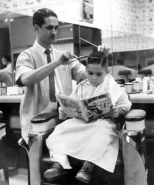 Recently I had the opportunity to meet some examples of an almost extinct kind of men who trained in their professions or trades prior to 1959, and who still preserve the way of working and living that they learned then.
Recently I had the opportunity to meet some examples of an almost extinct kind of men who trained in their professions or trades prior to 1959, and who still preserve the way of working and living that they learned then.
It is impressive to talk with these gentlemen; they have a kind of elegance, presence, a way of projecting themselves that simply inspires respect.
The barber I want to talk about is 76 and lives in a building almost in ruins in Central Havana. He has cut the hair of every kind of Cuban from the ‘50s until today. The small place he uses as a barber shop is a museum that jealously guards objects and documents: electric hair clippers, facial massage vibrators, blades, and God knows how many other things.
From the moment I knocked on the door, this gentleman made me feel like a real customer. The way he treated me made me believe my money had no value. We were alone, no one was shouting or interrupting the explanation he leisurely gave me about the services he could offer. The whole time he addressed me formally and with respect.
Once seated, the first thing he did was to make sure I chose well and conveyed to him, sparing no details, how I wanted my hair cut. Then he smoothly got to work, able to bend his body to access different levels without having to bother me about it, and if it was unavoidable that I needed to change my position, he said “please” and “thank you.”
I was so satisfied I decided to take advantage and get a facial mask and massage. All the work was completed professionally, leaving me looking good enough to go to a reception.
On asking the price I got another great surprise, “It’s 20 Cuban pesos,” he answered with a friendly gesture. [Less than a quarter, U.S.]
Everyone who lives in Havana knows that this price is amazing for a haircut and two additional services. I gave him a modest tip: the most willing I have ever given!
I looked discretely through the door, ajar, and noticed a very humble home. I couldn’t help but ask, “Sir, forgive my indiscretion, but, I can’t believe you can charge so little? Do you plan to retire at some point?”
“Young man, I retired long ago,” he said, “but with what they pay me I can’t eat for even four days. And the price… I consider it fair. The fact that I don’t have enough money doesn’t mean I have to exploit others, who also do not have enough money. On the contrary, instead of raising prices we should all do the opposite and help each other.
“In my hometown, Camaguey (before this, of course), when things got tight and some families could not afford enough food, the shopkeepers gave them credit until things improved, or they lowered the prices and, in some cases, even gave products away. That doesn’t happen today. On the contrary: they’re at loggerheads with each other and I am dying of grief at the sight. Hopefully, God willing, you’ll live to see things get better. Me, I don’t think I’ll see that again.”
The words of this old man shook me up. There was no room in my mind for how a man, trained in a system that, according to some, “turns men into bloodthirsty beasts,” could have such convictions and feelings.
Thinking about this, my grandparents also came to mind, their values, their “Cubanness,” their endless honesty. And then I wondered if it will be best to continue inventing the happy “New Man,” which seems to move farther and farther from its original project, or, conversely, if it might be worth trying to recover the old man, who was already pretty good and whom we are losing completely, at the risk of being left with none.
From Diario de Cuba
8 May 2012
